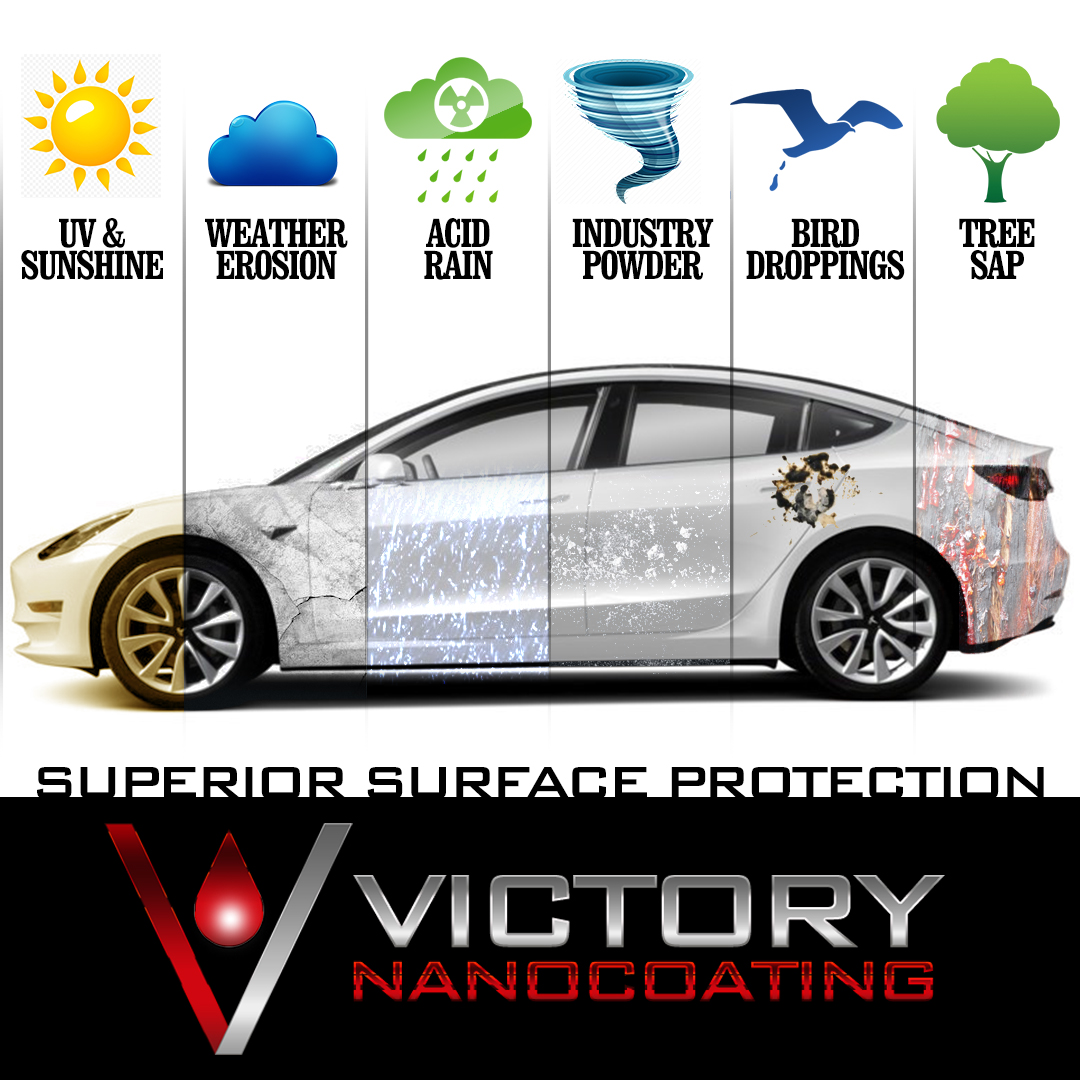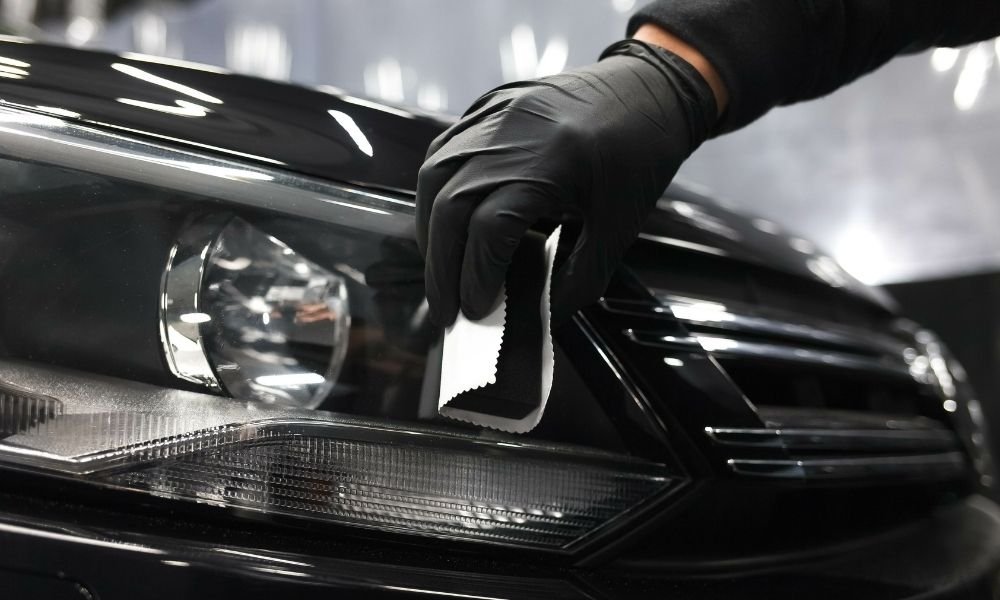Final Touch Auto Works Ceramic Coatings vs. DIY Kits: What You Need to Know
Final Touch Auto Works Ceramic Coatings vs. DIY Kits: What You Need to Know
Blog Article
The Ultimate Overview to Ceramic Coatings: Enhancing Your Vehicle's End up and Sturdiness
Ceramic coatings could be the service you have actually been looking for if you're looking to boost your cars and truck's look and defense. These innovative finishings bond with your lorry's paint, creating a sturdy obstacle against ecological damage. However how do they compare to traditional wax? Recognizing the benefits and application process can make a considerable distinction in your vehicle care routine. Let's explore what makes ceramic coatings a rewarding financial investment for your automobile.
What Are Ceramic Coatings?
Ceramic coverings are advanced safety layers that enhance your cars and truck's outside. They're made from a fluid polymer that chemically bonds with your car's paint, producing a long lasting guard. Unlike conventional wax or sealants, which wear off in time, ceramic coverings give resilient security against ecological impurities like UV rays, dust, and chemicals.When you apply a ceramic covering, you're spending in a barrier that pushes back water, making it much easier to cleanse your vehicle and maintaining it looking more recent for longer. This innovation helps preserve the stability of your paint, minimizing the danger of scrapes and oxidation.Ceramic finishes can be found in numerous solutions, each designed to satisfy various requirements and preferences. You can pick a do it yourself set or choose for professional application, relying on your comfort degree and spending plan. Generally, ceramic finishings represent an advanced option for keeping your lorry's visual charm and durability.
Advantages of Ceramic Coatings
You reveal a variety of advantages that go past plain appearances when you spend in a ceramic finishing. To start with, it provides outstanding security versus environmental pollutants like dust, bird droppings, and UV rays, maintaining your cars and truck's paint looking brand-new much longer. You'll notice that maintenance comes to be less complicated, as the hydrophobic homes create water and crud to slide off effortlessly. This means less time invested cleaning and detailing your vehicle.Additionally, ceramic coatings can boost the gloss of your cars and truck's surface, offering it that showroom sparkle. They likewise use resistance to scratches and swirl marks, which assists keep your vehicle's resale value. With a ceramic finish, you're not simply protecting your financial investment; you're likewise enhancing its general appearance and durability. Inevitably, this innovative technology guarantees your auto stands out while taking pleasure in long-term advantages that standard waxes merely can't match.
The Application Refine: Exactly How to Use Ceramic Coatings
Applying a ceramic finish entails numerous essential steps to assure suitable outcomes. Completely wash your auto to remove any kind of dust, gunk, or contaminants. This assures the surface area is ready and tidy for the layer. Next, sanitize the paint making use of a clay bar to eliminate embedded bits. Later, check the paint for imperfections and polish it to accomplish a smooth surface.Once your car's surface area is prepped, apply the ceramic covering in little areas. Utilize an applicator pad to spread the coating uniformly, following the manufacturer's instructions. Allow the finishing to treat for the suggested time, typically in between one to 2 hours, depending upon the product.Finally, prevent cleaning your car for at the very least a week to allow the finish bond effectively. Complying with these steps will certainly help you accomplish a long lasting, high-gloss surface that safeguards your vehicle for many years to come.

Comparing Ceramic Coatings to Typical Wax
After guaranteeing your auto's surface area is perfectly prepped with a ceramic covering, it's time to ponder how this modern-day remedy compares to standard wax. Ceramic finishes provide a durable layer of protection that lasts for years, while wax commonly uses just a couple of weeks of luster. You'll discover that ceramic coatings bond with your paint, producing a hydrophobic surface that wards off water and dust, making upkeep easier.In comparison, conventional wax sits on top of the paint and needs frequent reapplication. With ceramic finishings, you get exceptional scrape resistance and UV defense, helping to stop fading and oxidation. While the first financial investment for a ceramic layer is higher, the lasting benefits often outweigh the expenses. If you're looking for sturdiness and boosted gloss, ceramic finishings are a smart selection over standard wax.
Upkeep Tips for Your Ceramic Covered Vehicle
To keep your ceramic-coated vehicle looking beautiful, normal upkeep is vital. Start with a gentle laundry making use of a pH-balanced shampoo; prevent extreme cleaning agents that can degrade the finishing. Use a microfiber laundry glove to stop scratches and always wash completely to remove any type of soap residue.After cleaning, completely dry your vehicle with a soft microfiber towel to stay clear of water spots. Consider applying a ceramic upkeep spray every couple of months to improve the finishing's hydrophobic residential properties and add an extra layer of protection.It's likewise smart to avoid automatic auto cleans with abrasive brushes, as they can harm the finish. Instead, choose for hand washes or touchless wash alternatives. Additionally, regularly evaluate your lorry for contaminants like tree sap or bird droppings and resolve them promptly to protect against etching. Adhering to these tips will help keep the luster and longevity of your ceramic-coated vehicle for several years ahead.
Typical Myths Concerning Ceramic Coatings
Despite the outstanding advantages of ceramic coatings, several misconceptions can produce complication for auto proprietors. One typical misunderstanding is that ceramic layers remove the demand for maintenance. While they do offer improved protection, routine cleaning and care are still important to keep that high-gloss finish.Another myth is that these layers are scratch-proof. While they supply a strong layer of protection against minor scrapes, Visit Your URL they can't hold up against severe impacts or unpleasant materials.Many likewise believe that ceramic coverings will certainly make their cars and trucks unsusceptible to all contaminants. Actually, they fend off dust and water however won't protect against concerns like bird droppings or tree sap from creating damage if left unattended.Lastly, some assume that applying ceramic finishings is a DIY job anybody can take care of, however attaining a remarkable application typically calls for professional experience to assure peak results.
Picking the Right Ceramic Layer for Your Cars and truck
How do you choose the ideal ceramic covering for your car? Start by thinking about the degree of protection you require. If your auto deals with extreme climate reference or constant journey, select a high-end covering that offers superior sturdiness and resistance to scrapes, UV rays, and chemical stains.Next, think of the application technique. Some finishes require professional setup, while others are DIY-friendly. If you're experienced, a DIY product could conserve you cash, but also for the most effective outcomes, a specialist can guarantee proper application.Don' t forget to check the longevity of the layer. Some last a couple of years, while others can shield for a years or even more. Check out reviews and reviews to evaluate individual contentment. By evaluating these variables, you'll find a ceramic layer that not only improves your cars and truck's look however likewise provides resilient security.
Often Asked Questions
How Much Time Do Ceramic Coatings Last usually?
Ceramic finishes usually last anywhere from 2 to five years, depending on factors like application, maintenance, and ecological conditions. You'll intend to comply with correct care regimens to optimize their longevity and efficiency.
Can Porcelain Coatings Be Applied Over Paint Scratches?
You can not use ceramic coatings over paint scratches properly. It's best to fix any scratches first, making certain a smooth surface - Final Touch Auto Works Ceramic Coatings. By doing this, the coating bonds appropriately and gives perfect security for your vehicle's finish
Are Ceramic Coatings Safe for All Cars And Truck Surface areas?
Ceramic layers are typically secure for the here are the findings majority of auto surfaces, including paint, glass, and wheels. Nevertheless, it is critical to examine details item standards, as some coatings might not appropriate for sure products or coatings.

Will Porcelain Coatings Protect Against UV Damage?

Can I Do Touch-Ups on Ceramic Coated Surface Areas?
You can do touch-ups on ceramic coated surfaces, but it's important to make use of suitable items. Confirm the location is clean and adhere to proper application strategies to keep the covering's honesty and performance. Unlike standard wax or sealants, which use off over time, ceramic layers provide long-lasting security against ecological contaminants like UV rays, dirt, and chemicals.When you apply a ceramic layer, you're spending in a barrier that drives away water, making it less complicated to clean your cars and truck and keeping it looking newer for longer (Final Touch Auto Works Ceramic Coatings). Later, examine the paint for flaws and polish it to achieve a smooth surface.Once your vehicle's surface is prepped, use the ceramic coating in tiny sections. Allow the finishing to treat for the advised time, normally in between one to 2 hours, depending on the product.Finally, stay clear of cleaning your automobile for at the very least a week to allow the finish bond properly. Think about using a ceramic maintenance spray every few months to improve the layer's hydrophobic buildings and add an additional layer of protection.It's also smart to avoid automatic automobile cleans with rough brushes, as they can damage the coating. Ceramic finishings are normally risk-free for most vehicle surfaces, including paint, glass, and wheels
Report this page